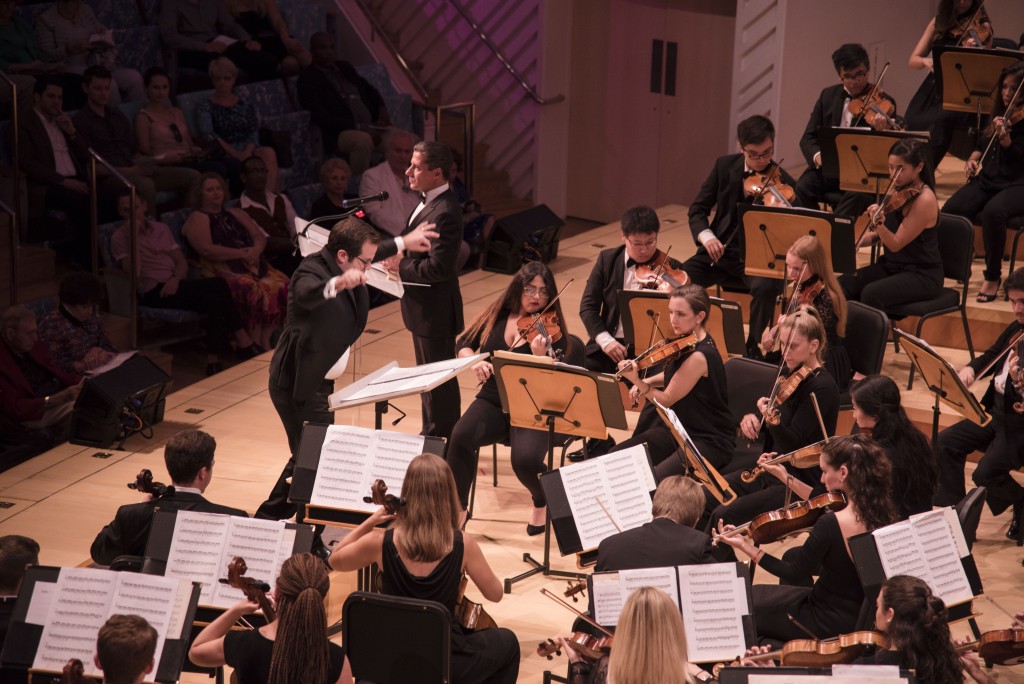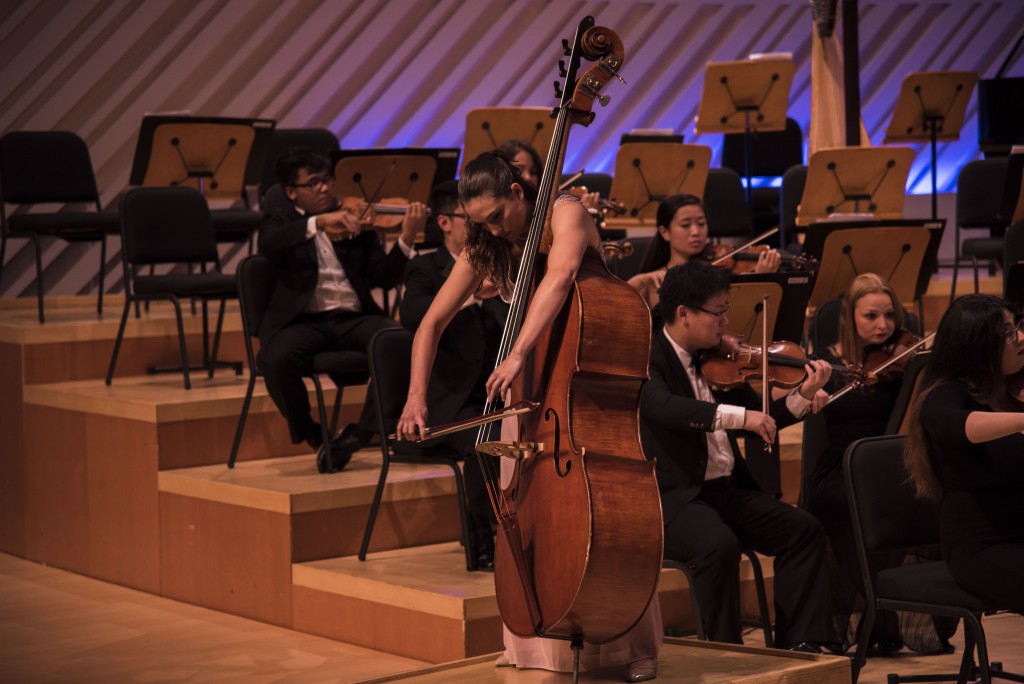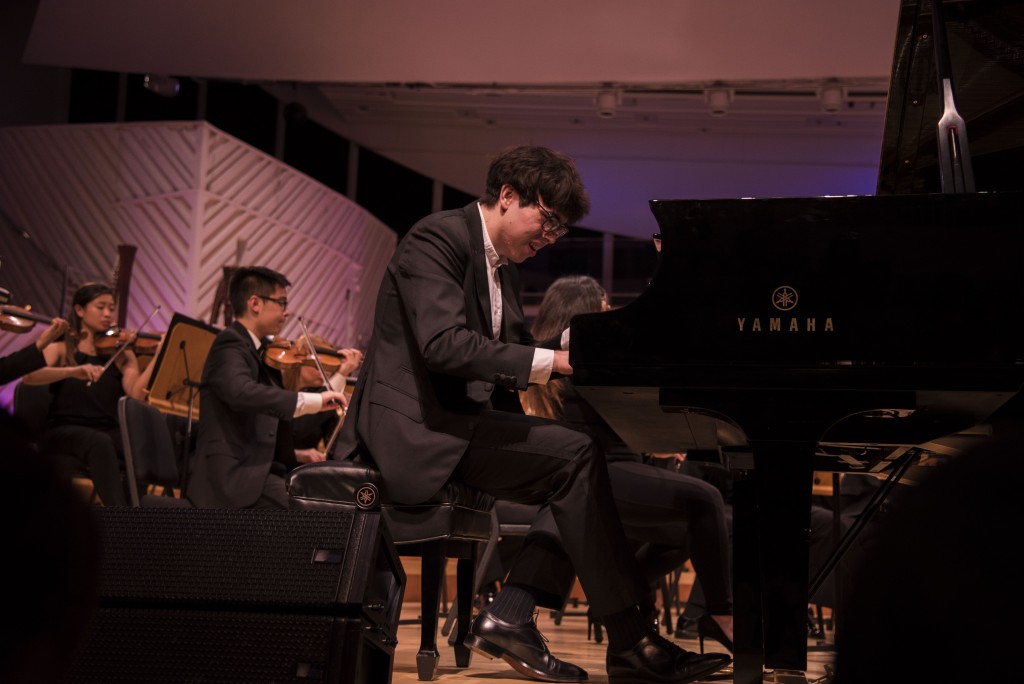
MIAMI BEACH — You can’t say Michael Rossi doesn’t give you enough to listen to.
Saturday night at the New World Center, the head of the Miami Music Festival presented an orchestral concert dedicated to the eminent Polish-born violinist Ida Haendel that featured parts and wholes of five concertos, a massive tone poem and a world premiere. In addition, there was a presentation to Haendel of an award from the festival saluting her for an eight-decade musical career.
It was a night that lasted three-and-half hours, but it showcased some exceptional young musicians and the powerful symphonic ensemble they have created as part of the festival’s orchestral program.
The program opened with Two Poems of Hyam Plutzik, a work by American composer Jeffery Briggs based on work by Plutzik (1911-1962), who taught at the University of Rochester and was a Pulitzer Prize finalist. He died relatively young at age 50 of cancer; his daughter Deborah, an organizer of arts events at Miami Beach’s Betsy Hotel, is Briggs’s wife.
The work is for orchestra and narrator; the speaker Saturday night was Alberto Carvalho, superintendent of the Miami-Dade County Public Schools. Briggs’s piece, which was getting its world premiere but was written about five years ago, evokes two poems, “An Equation,” which describes the perfection of a snake, and “Jim Desterland,” in which an angler hears the roar of the universe’s vastness even on a silent day of waiting for a fish.
Briggs’s music is beautifully crafted, colorfully orchestrated and highly atmospheric. Broadly speaking, it sounds something like a 21st-century update of Debussy’s La Mer, with lots of oceanic effects such a continual rapid blur in the strings and big, glassy brass chords moving in and out. The poems themselves are very much in the mid-century American tradition of writers such as Randall Jarrell, and they were well-spoken by Carvalho, who added a touch of mystery to the final line of the second poem, in which the “little doors” of the world beyond “swing wide.”
Rossi conducted it well, bringing out the more prominent motifs — a little minor-key scale pattern in the basses, a falling chromatic line in the cellos — carefully. The orchestra played well and gave a good account of this fine piece.
Winners of the Miami Music Festival concerto competition followed a presentation to Haendel, who took the stage after a brief video about her career (though it was scarcely comprehensive) that demonstrated her formidable playing, particularly in a performance for Pope Benedict XVI. The 87-year-old musician, whose career was based primarily in Britain, was effusive in her thanks to the festival and it was charming to see her cast off her high heels as she made her way back to her seat in the auditorium.
The four concerto excerpts on the first half featured three rarely heard works, beginning with first movement of the Harp Concerto by Carl Reinecke, played by Anna Ellsworth, currently a student at the Boston Conservatory. Reinecke’s work, from 1884, is a sturdy piece of German Romanticism, with attractive but unremarkable melodies. Ellsworth played it spotlessly, though, and as a piece of rarely heard repertoire it was nice to hear. The orchestra was led by Todd Craven, a member of the festival’s Conducting Institute; he wisely kept the ensemble quiet and well out of Ellsworth’s way.

Flutist Jessica Chancey, a Longwood native studying at the Cleveland Institute, was the fine soloist in the first movement of a familiar work, the Flute Concerto No. 2 (in D, K. 314) of Mozart. Chancey has a very pretty, elegant sound, and she handled the busy solo parts with sovereign ease; conductor Jacobsen Woollen was an expert accompanist.
Alexandros Petrin, a Greco-Russian violinist who holds degrees from the Manhattan School of Music, closed the first half with the Suite in the Old Style of the Norwegian composer Christian Sinding, who was well-known to generations of pianists gone by for his salon piece, “Rustle of Spring.” This three-movement suite is a concerto in all but name, and has affinities with the Holberg Suite of Sinding’s older countryman Edvard Grieg.
Petrin proved to be an exciting, impressive violinist with significant audience appeal. His sound is not particularly large, but it has fire and intensity, as he demonstrated right off the bat with the rapid-fire virtuosity of the suite’s opening bars. He played the lovely, somber second movement with high emotion and a rich, passionate tone, and in the finale gave the music’s folkish cast vigor and snap. Rossi conducted this neglected but worthy piece with enthusiasm, and Petrin received well-deserved rounds of bravos from the audience.

Murphy and the orchestra disagreed about the tempo in the opening pages of the first movement, and he ran into real trouble in the third movement. In the repeat of the second theme he stumbled at the end of his solo portion, and in the repeat of the triplets-over-pizzicato section that takes the music on to the final pages, he was in the wrong key for several bars, creating quite a hair-raising polytonal Ivesian Rachmaninov. My best guess is that having played this piece many times already, his attention wandered and he temporarily forgot that he was in the repeat sections, which are in a different key (D-flat instead of B-flat, G-flat instead of E-flat). He’ll remember the sting of that mishap for the future, no doubt; despite that, he is a pianist well worth watching, and he could easily have a big career if he chooses the right material and is well-managed.
The orchestra closed the concert with Richard Strauss’s tone poem Also Sprach Zarathustra. Like the Mahler Sixth and Wagner programs of the past couple weeks, this is a hugely ambitious piece to schedule for this young orchestra, but it came off rather well. One overall difficulty was that the electric keyboard that filled in for the organ was not quite in tune with the rest of the orchestra, which speaks to an oversight in tuning preparation.
Still, the big, familiar fanfare sounded splendid, and Rossi did a good job of leading his students through the thickets of this sprawling work. Concertmistress Ani Bukujian and violinist Jude Park (who was concertmistress for the Mahler) made a good duo in the galumphing waltz section, and the musicians seemed to understand the spirit of the piece well. This is a virtuoso work for everyone in the orchestra, and while it needed another couple days of polish, the overall impression was that of a huge symphonic ensemble bringing a ferociously overwrought Romantic effusion to vivid life, and you can’t ask much more than that for Strauss.
The Miami Music Festival concludes with three operas, Robert Ward’s The Crucible on Thursday and Saturday evening, and Mozart’s The Magic Flute on Friday evening and Sunday afternoon, both at Barry University’s Broad Center for the Performing Arts. Meanwhile, Umberto Giordano’s rarely heard one-acter Mese Mariano is presented Saturday and Sunday afternoon at Barry’s Cor Jesu Chapel. For more information, see miamimusicfestival.com.